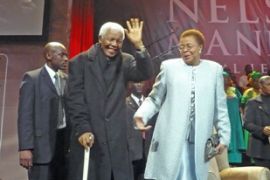S Africa urged to act on Zimbabwe
Liberian president uses Mandela lecture to warn that Zimbabwe might face civil war.

Talking as the keynote speaker at the sixth annual Nelson Mandela lecture, Johnson Sirleaf said that Mbeki “as then chairman of the Organisation of African Unity, was instrumental in putting Liberia on the road to peace and we pray that he will do the same for Zimbabwe”.
Johnson Sirleaf gave a veiled warning as to the consequences for Zimbabwe if action is not taken.
“In 1985, Liberia held a sham election that was endorsed by Africa and the world.
“Thirty years of civil war and devastation followed, with thousands dead and millions displaced. It need not have happened.”
‘New Africa’
Johnson Sirleaf spoke of a “new Africa”, led by the values of Mandela, in which all Africans were responsible for their collective future.
She said that, no matter what progress African countries make, unless there is regional stability the “the dream of democracy and accountability will remain unfulfilled”.
“We cannot lose sight of the fact that we in Africa do not have the luxury to enclose ourselves in our respective political enclaves,” she said.
“Our national policy process must be cognizant of the region in which we find ourselves.
“That is why it is imperative that our national public policy processes take into account what is happening in other places, by reflecting our regional and continental conditions.”
‘No impunity’
Making a reference to Robert Mugabe, the Zimbabwean president, Johnson Sirleaf, 69, stressed that “Africa is changing” and that “no longer can any leader think the impunity of prior years can exist”.
 |
| The annual Mandela Lecture comes days before the former president’s 90th birthday |
She said that any leader who infringes the rights of the people would be held accountable.
Liberia has previously questioned the legitimacy of the Mugabe government, which is accused of widespread intimidation and violence to secure an election victory on June 27.
The Liberian president, known as the “iron lady” due to her strong will and determination, said that the “renaissance of Africa was now at hand”.
The first democratically elected female president in Africa cited the spread of democratisation on the continent since 1989, led by countries such as Namibia, South Africa and Mozambique, to now having 20 democracies in sub-Saharan Africa.
She praised the contribution South Africa has made towards a positive future for the continent, “achieved through collective effort and built on years of sacrifice and yearning”.
Johnson Sirleaf, who came to power in 2005 after 14 years of almost constant civil war, spoke of the inspiration of Mandela’s ability to lead, motivate and show compassion.
Human solidarity
In a brief opening, Mandela, a former South African president, asked listeners to remember “the importance of friendship and to put human solidarity at the centre of your life”.
He said: “There is still too much discord, hate, conflict and violence” at the start of the 21st century.
The lecture comes the week before Mandela’s 90th birthday on Friday.
Previous key-note speakers include Bill Cinton, a former US president, Thabo Mbeki, the South African president, and nobel laureate Archbishop Desmond Tutu.
Anti-apartheid movement
Kliptown is the site of the adoption of the Freedom Charter, in 1955, drawn up by the black opposition to the apartheid policies of the white minority government of the time.
The Freedom Charter established the principles and policies of the African National Congress (ANC) party, which was then in opposition but has lead the South African government since elections in 1994.
It proclaimed a bold development manifesto for South Africa and confirmed that the benefits were to be shared by “all who live in South Africa”.
Mandela was officially banned by the incumbent National party a the time, so was not allowed to engage in politics and the meeting of about 3,000 people.
However, as part of his commitment to the struggle against racial segregation of blacks in South Africa Mandela later admitted that he did find “a place at the edge of the crowd where [I] could observe without mixing or being seen”.